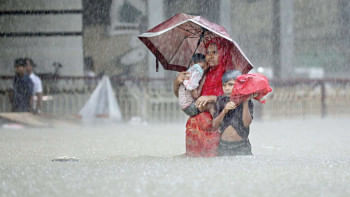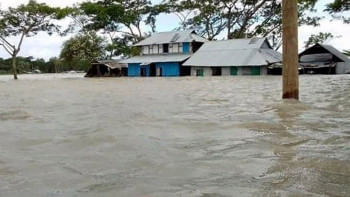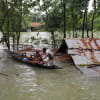Global loss and damage initiative launched in Dhaka

This week, the UK-based International Institute for Environment and Development (IIED), together with the International Centre for Climate Change and Development (ICCCAD), launched a global initiative in Dhaka to address loss and damage from human-induced climate change. The initiative, called the Alliance for Locally-Led Approaches for Transformative Action on Loss and Damage (ALL ACT on LnD), is aimed at supporting vulnerable developing countries to build knowledge and capacity to address impacts of climate change and the consequent losses and damages in those countries.
The global launch was held with online participation from small island developing states (SIDS) as well as Least Developed Countries (LDCs), and also by representatives from developed countries such as the UK, Germany, the US, Ireland, New Zealand, along with UN agencies and others.
This new initiative aims to support both governments and civil societies in the vulnerable countries to enhance their knowledge of and responses to the adverse impacts of human-induced climate change, which have now become a reality around the world.
These efforts to enhance understanding and build capacity in each country are complementary to the ongoing discussion under the United Nations Framework Convention on Climate Change (UNFCCC) to implement the ground-breaking decision to establish a funding mechanism to address loss and damage, agreed upon at the annual climate conference (COP27) last year.
The process under the UNFCCC is moving forward with the creation of the Transitional Committee on loss and damage funding, which will meet three times before COP28 this year and provide advice to the negotiators on how to operationalise the funding mechanism.
These efforts to enhance understanding and build capacity in each country are complementary to the ongoing discussion under the United Nations Framework Convention on Climate Change (UNFCCC) to implement the ground-breaking decision to establish a funding mechanism to address loss and damage, agreed upon at the annual climate conference (COP27) last year.
At the same time, the second Glasgow Dialogue on loss and damage is due to be held in June in Bonn, Germany, which will allow governments and experts to share ideas on the issues that need to be addressed at COP28. These include where the funds will come from, how much money is needed, who will manage the funds, who will be eligible to receive the funds, etc.
While all these questions are indeed legitimate and need to be discussed, debated and agreed upon in good faith, the highest priority, in my view, must be given to delivering outcomes rapidly and helping the poorest victims who are already suffering losses and damages now.
At the launch of ALL ACT, we were reminded of this urgency by the representative of Vanuatu, who described the devastation caused by two successive typhoons that hit the country a few days ago.
Thus, the challenge for the Transitional Committee members as well as the negotiators ahead of COP28 is to deliver outcomes at a speed never seen before. They also need to provide funds proactively to the victims in cash and not require project proposals to be submitted, which take too long to process. One important source of expertise and knowledge is the humanitarian sector, which has developed many ways to bring support to vulnerable communities in vulnerable developing countries.
It is therefore essential that the initiative under UNFCCC be coordinated with the United Nations Office for Coordination of Humanitarian Affairs (UNOCHA). A special envoy for loss and damage should be appointed to connect the UNFCCC with UNOCHA as well as the vulnerable communities/countries. The new ALL ACT initiative can provide support to this end going forward.
Dr Saleemul Huq is director of the International Centre for Climate Change and Development (ICCCAD) at Independent University, Bangladesh (IUB).

 For all latest news, follow The Daily Star's Google News channel.
For all latest news, follow The Daily Star's Google News channel. 










Comments